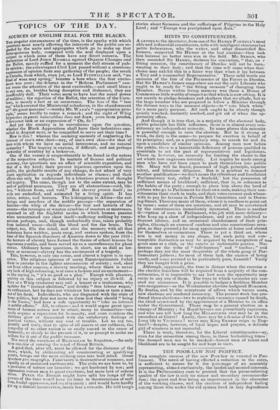HINTS TO CONSTITUENCIES.
A LETTER to time Spectator, from One of Sir HENRY PARNELL'S most able and influential constituents, tells with intelligent clearness but polite forbearance, why the writer, and other dissatisfied Re- formers, supported Sir HENRY at the last election—they took him because no better man was in the field. Mr. SYMON, who then seconded Sir HENRY, declares his conviction, " that, on r fitting occasion, the constituency of Dundee will not be foun. wanting in their duty ; and that the time will come when Mei!, choice may exhibit this in a fairer way than when it lay between a Tory and a trammelled Representative." These mild words are ominous of the fate of the Paymaster of the Forces in Dundee. But Sir HENRY'S former supporters are not the only Liberals who ought to be ready for " the fitting occasion" of changing their Member. Never within living memory was there a llouse ,of Commons so little worthy of respect as that which is now sitting. It is not merely to pledge-breakers and skulkers that we allude, but to the large number who are prepared to follow a Minister through the dirtiest ways to the meanest objects—to " vote black white" for a mere party purpose. All such ought to be closely though quietly watched, distinctly marked, and got rid of' when the op- portunity offers.
And though it is true that, in a majority of the electoral body,
public principle has little influence, there is in almost every con- stituency an independent minority. In some places this minority is powerful enough to turn the election. But be it strong or weak, its duty is the same—to prepare for exertion in behalf of its principles; and, as a preliminary step, to search for and fix upon a candidate of similar opinions. Among men now before the public, these is a lamentable deficiency of persons qualified in essentials to act the part of representatives and legislators. There is, however, no necessity for limiting the choice to the set which now engrosses notoriety. Let inquiry be made among men who have not been eager to push themselves into public life. Many will be found, possessed of high principle, superior talent, and laborious diligence. But it is prudent to demand another qualification—we don't mean the ridiculous and fraudulent Parliamentary test, called " a freehold," but the possession of sufficient means of livelihood ; sufficient, that is, in reference to the habits of the party ; enough to place him above the herd of jobbers who go to Parliament tor their own ends, making their con- stituencies their stock in trade, and their votes current cash where- with to pay for favours in Private Bill Committees and in Down- ing Street. There are many of these, w horn it is needless to point out by name; some of them are notorious, and all may be ascertained by the constituencies immediately interested. There is another deseription of men in Parliament, who job with more delicacy— who keep up a show of independence, and yet are indebted to discreet silence, and an occasional abandonment of their prin- ciples, (through an excess of candour and nice conscientious scru- ples, as they pretend,) for snug appointments at home and abroad for themselves or connexions. There is yet a third set, whose aim is not money in any shape, but such petty and con- _ temptible distinction as may be acquired by the recognition of awl
great man at a club, or the entree at fashionable parties. Nu- merous are the tribe of " tuft-hunters" and " toadies ; " and perhaps they are the most despicable of the whole gang of Par- liamentary jobbers ; for most of them lack the excuse of being needy, and sonic pretend to be particularly pure, forsooth! Verily they are bought with a price.
Although, apparently, the time is distant when the exercise o the elective franchise will be required from a majority of the con- stituencies, it is impossible to say bow soon the opportunity may occur to any one of them. The ways in which vacancies are cre- ated are numerous. It is possible to badger a faithless Member into resignation—as the Westminster electors badgered BoaDarr. By deaths, and by the acceptance of offices which vacate seats, new elections are rendered necessary. The present week has pro- duced three elections—two to replenish vacancies caused by death, the third occasioned by the appointment of a Member to an office under the Government. There may be a general election on a change of Ministry ; for Royal favours are proverbially capricious, and who can tell how long the Mesnounee star may be in the 'ascendant at Court? Lastly, there may be a demise of the Crown. Long life to VICTORIA never may King ERNEST reign in Eng- land !—despite, however, of loyal hopes and prayers, a delicate girl of nineteen is not immortal.
There is work, therefore, for the Liberal constituencies—ay, even for the minorities among them, in these backsliding times • the doomed men are to be marked—honest men of talent and likelihood are to be sought for and kept in view.


























 Previous page
Previous page